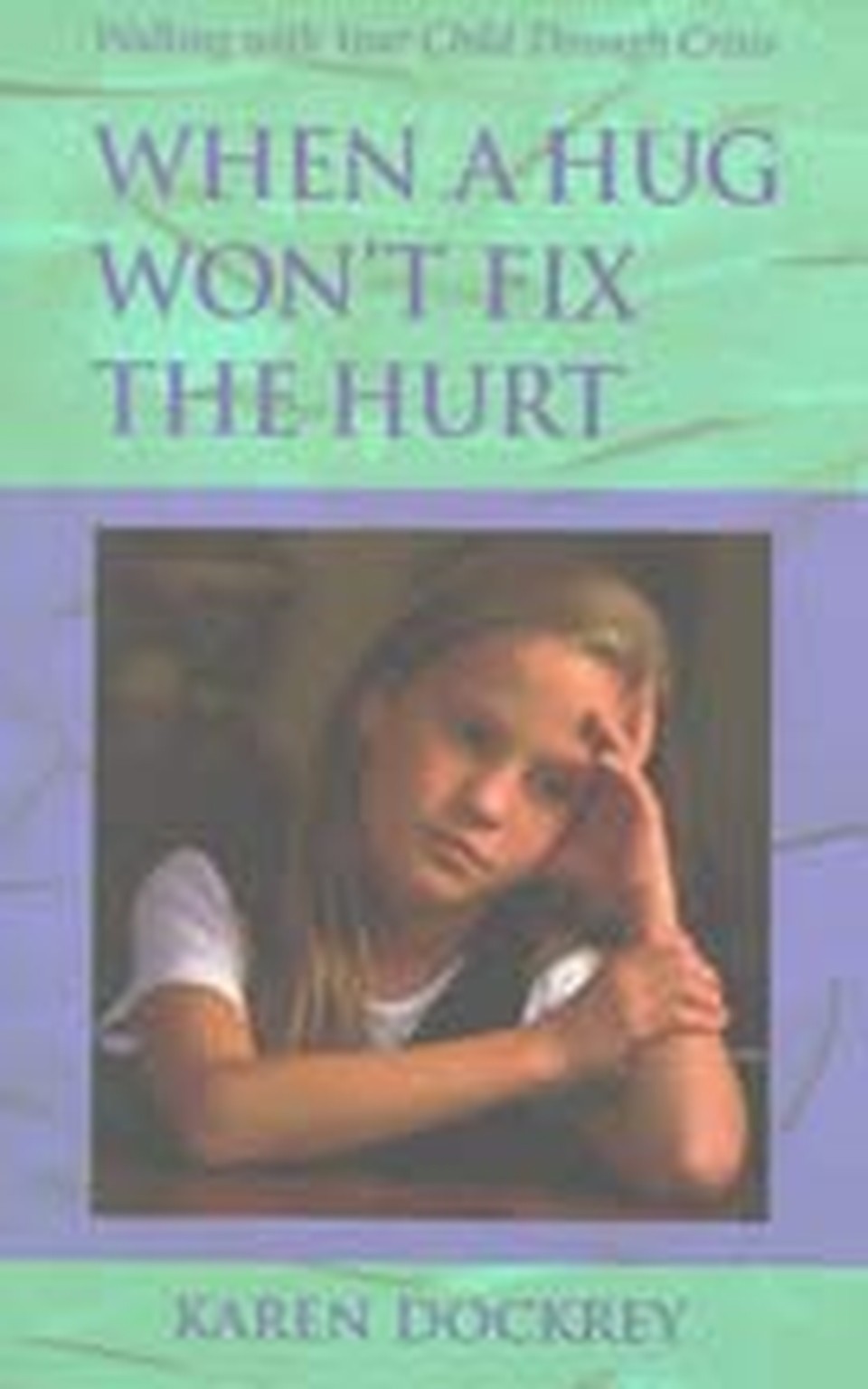Help Your Child Through a Crisis
Let your child express pain, then offer Christ's hope
Published Nov 01, 2001

No matter how severe the crisis, we Christians can make it through. We make it because there's a better day coming. One day Jesus will return, and there will be no more pain or tears (Rev. 21:4). This hope doesn't take away the pain, but it gives us light to walk toward. After I explained that my daughter Emily had a 70 percent chance of disease-free survival from cancer, my sensitive friend Lynne pointed out, "That's the hope, but the pain is now." She gave me permission to hurt. And I hugged her for it.
Give your children similar permission by letting them feel their pain. When Amanda's friend Amy died, Amanda's sister Susan felt the pain, too.
"I keep trying not to think about Amy's death, but it stays in my brain," said Susan.
"It's OK, honey, just cry and feel," her mother responded.
"I don't want to go to school anymore. I want to see Amy," Susan wailed.
"We'll see her in heaven, but we'll have to wait until then. I wish we could see her now."
Turning to her sister's pain, Susan asked, "What if Amanda is sad all the time? Or what if Amanda forgets Amy is dead?"
At 6 years of age, Susan feared that missing someone who could never come back meant you would always be sad. She also thought the opposite was true - if you were happy again, you would forget the person who died. Her parents helped her mesh the two.
"We'll always miss Amy, but we will feel happy again. Sometimes thinking of her will bring smiles to our faces because we'll remember a funny thing she said, or we'll remember a fun thing we did together. Other times thinking of her will make us feel very sad because we wish she were here and could do things with us. Both happy and sad feelings are a sign of love. The strong pain we feel right now won't last forever."
Susan's parents accepted her pain but gave her hope for better times ahead. They used Scripture and experience to verify both the pain and the hope. It's a delicate balance, but one worth striving for.
Let the feelings go
Children teach us a lot by the way they experience pain. Especially when they are very young, children express pain fully. They cry or put their sadness into frank words. When the source of pain is gone, so is their worry about it. Sarah seldom lets her frustration over soccer bother her for long. Her anguish is intense when it comes; but after she expresses herself, she attacks new challenges rather than fretting about past ones. She finds ways to hear. She finds ways to make friends. She moves from worry to action. Sarah teaches me to break my adult pattern of worrying about pain before, during, and after it happens. She and other children accept pain, walk through it, and then forget about it.
Perhaps children understand that pain is a part of life - not a fun part, but a definite part. Perhaps they understand Bible writer Peter's admonition, "Dear friends, do not be surprised at the painful trial you are suffering, as though something strange were happening to you" (1 Peter 4:12). But even with this understanding, children's pain matters. Don't minimize it with "they're children; they'll get over it" or similar cliches. Pain is a part of living on this imperfect earth. In heaven we'll have no more pain, but for now we do. Help your children live this reality by accepting their pain, helping them interpret and respond to it, and walking through pain with them. As Christians, we have the added advantage of God's care, company, counsel and comfort. He'll show us just what to do and how.
Excerpted from When a Hug Won't Fix the Hurt: Walking with Your Child Through Crisis, copyright 2000 by Karen Dockrey. Excerpted by permission of New Hope Publishers, Birmingham, Ala., www.newhopepubl.com, 1-800-968-7301. All rights reserved.
Karen Dockrey is the author of more than 28 books and has been working with and writing for youth for more than 26 years. She is the mother of two teenagers who have both faced severe crises.
How is your child handling the current national crisis? Has your child been dealing with a personal crisis lately? How has your faith given you strength to help your child handle crises in his or her life? Visit Live It's forum to respond, or read what others have to say. Just click on the link below.
Give your children similar permission by letting them feel their pain. When Amanda's friend Amy died, Amanda's sister Susan felt the pain, too.
"I keep trying not to think about Amy's death, but it stays in my brain," said Susan.
"It's OK, honey, just cry and feel," her mother responded.
"I don't want to go to school anymore. I want to see Amy," Susan wailed.
"We'll see her in heaven, but we'll have to wait until then. I wish we could see her now."
Turning to her sister's pain, Susan asked, "What if Amanda is sad all the time? Or what if Amanda forgets Amy is dead?"
At 6 years of age, Susan feared that missing someone who could never come back meant you would always be sad. She also thought the opposite was true - if you were happy again, you would forget the person who died. Her parents helped her mesh the two.
"We'll always miss Amy, but we will feel happy again. Sometimes thinking of her will bring smiles to our faces because we'll remember a funny thing she said, or we'll remember a fun thing we did together. Other times thinking of her will make us feel very sad because we wish she were here and could do things with us. Both happy and sad feelings are a sign of love. The strong pain we feel right now won't last forever."
Susan's parents accepted her pain but gave her hope for better times ahead. They used Scripture and experience to verify both the pain and the hope. It's a delicate balance, but one worth striving for.
Let the feelings go
Children teach us a lot by the way they experience pain. Especially when they are very young, children express pain fully. They cry or put their sadness into frank words. When the source of pain is gone, so is their worry about it. Sarah seldom lets her frustration over soccer bother her for long. Her anguish is intense when it comes; but after she expresses herself, she attacks new challenges rather than fretting about past ones. She finds ways to hear. She finds ways to make friends. She moves from worry to action. Sarah teaches me to break my adult pattern of worrying about pain before, during, and after it happens. She and other children accept pain, walk through it, and then forget about it.
Perhaps children understand that pain is a part of life - not a fun part, but a definite part. Perhaps they understand Bible writer Peter's admonition, "Dear friends, do not be surprised at the painful trial you are suffering, as though something strange were happening to you" (1 Peter 4:12). But even with this understanding, children's pain matters. Don't minimize it with "they're children; they'll get over it" or similar cliches. Pain is a part of living on this imperfect earth. In heaven we'll have no more pain, but for now we do. Help your children live this reality by accepting their pain, helping them interpret and respond to it, and walking through pain with them. As Christians, we have the added advantage of God's care, company, counsel and comfort. He'll show us just what to do and how.
Excerpted from When a Hug Won't Fix the Hurt: Walking with Your Child Through Crisis, copyright 2000 by Karen Dockrey. Excerpted by permission of New Hope Publishers, Birmingham, Ala., www.newhopepubl.com, 1-800-968-7301. All rights reserved.
Karen Dockrey is the author of more than 28 books and has been working with and writing for youth for more than 26 years. She is the mother of two teenagers who have both faced severe crises.
How is your child handling the current national crisis? Has your child been dealing with a personal crisis lately? How has your faith given you strength to help your child handle crises in his or her life? Visit Live It's forum to respond, or read what others have to say. Just click on the link below.
Originally published November 12, 2001.




